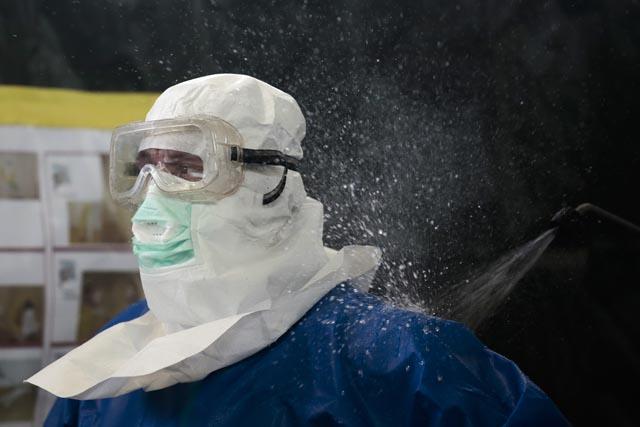You are here
‘Jordan ready to deal with any potential Ebola cases’
By Dana Al Emam - Oct 22,2014 - Last updated at Oct 22,2014
AMMAN — Jordan is ready to deal with any potential Ebola cases in an isolated and equipped department at Al Bashir Hospital with a 30-bed capacity, Health Ministry Spokesperson Hatem Azrui said on Wednesday.
“No Ebola cases have been registered in Jordan,” he told The Jordan Times over the phone, noting that the Kingdom does not ban the entry of visitors from the virus-infected countries.
Azrui added that the national committee for the prevention of epidemics, which includes representatives of the ministry, the Royal Medical Services (RMS), university hospitals and the private sector, has a plan in place, “which targets hospital staff”.
The plan includes training sessions for medics on dealing with Ebola cases, acquainting them with symptoms of the disease, he noted.
Azrui said there is no need for community awareness campaigns at this stage, since Ebola is “limited to some west African countries”.
This year’s outbreak of the highly infectious haemorrhagic fever, thought to have originated in forest bats, is the worst on record, having killed more than 4,500 people, mostly in Liberia, Guinea and Sierra Leone, according to Reuters.
The World Health Organisation (WHO), which so far has not recommended blanket travel or trade restrictions on the West African countries, has warned of 5,000-10,000 new cases of Ebola globally every week by December.
WHO has said the outbreak constitutes an international public health emergency and has urged the screening of passengers from Liberia, Sierra Leone and Guinea, Reuters reported.
Meanwhile, Brig. Gen. Eqab Abu Wandi, who heads RMS preventive medicine and public health department, said Jordanian peacekeepers in Liberia are Ebola-free and are located away from the infected areas.
“When WHO first announced the outbreak of the epidemic, a specialised RMS preventive medicine team was sent to Liberia to visit our officers there,” he told The Jordan Times over the phone, adding that they offer capacity-building services to the local police, and are not in direct contact with the public.
Abu Wandi added that all Jordanian forces are linked to an infection control medical team that applies the WHO epidemic control protocol, noting that the RMS preventive medicine team distributed brochures and delivered lectures on Ebola to the staff.
Jordanian peacekeepers are kept in medical isolation for 21 days, which is Ebola’s maximum incubation period, prior to returning to the Kingdom, and receive instructions on how to deal with any skin rashes or “unnatural symptoms”, according to Abu Wandi.
Jordan used to have a peacekeeping contingent in
Sierre Leone, but no longer, he noted.
Ebola, which is often fatal, is transmitted by direct contact with the blood, body fluids and tissues of infected animals or people, according to the WHO website.
Severely ill patients require intensive supportive care. During an outbreak, those at higher risk of infection are health workers, family members and others in close contact with sick people and deceased patients.
Related Articles
Travellers entering Jordan from Liberia, Sierra Leone and Guinea, the three West African countries hit hardest by the deadliest Ebola outbreak in history, will be monitored and undergo necessary checkups at the airport, according to the Ministry of Health.
Sierra Leone said Saturday it will confine people to their homes in a nationwide three-day shutdown later this month aimed at containing the Ebola epidemic threatening west Africa.
Liberia is making some progress in containing the Ebola outbreak while the crisis in Sierra Leone is going to get worse, the top anti-Ebola officials in the two countries said.
















